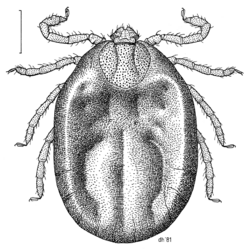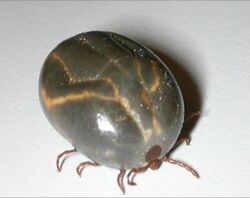Biology:Longhorned tick
| Haemaphysalis longicornis | |
|---|---|

| |
| Illustration by Des Helmore | |
| Scientific classification | |
| Kingdom: | |
| Phylum: | |
| Class: | |
| Subclass: | |
| Order: | |
| Family: | |
| Genus: | |
| Species: | H. longicornis
|
| Binomial name | |
| Haemaphysalis longicornis Neumann, 1901
| |
The longhorned tick (Haemaphysalis longicornis), also known as the bush tick, cattle tick,[1] Asian longhorned tick[2] or Asian tick[3] (because it is native to East Asia), is a parasitic arachnid belonging to the Ixodidae family of ticks. The longhorned tick is a known livestock pest, especially in New Zealand, and can transmit a disease called theileriosis to cattle but not to humans. However, the tick has been associated with several other tickborne diseases in humans.

An unfed female is typically 2.0–2.6 mm long and 1.5–1.8 mm wide, and grows to 9.8 mm long and 8.2 mm wide with engorgement.[5] Identifying a specimen from other members of the Haemaphysalis genus requires microscopic examination of minor physical characteristics.[6]
Geographic distribution
The longhorned tick is native to temperate areas of East and Central Asia, including China , Korea, and Japan , as well as Pacific islands including Australia , New Zealand, Fiji, and Hawaii, to name a few.[7]
The species was not known to be present on the mainland United States until November 9, 2017, when it was first discovered on a sheep farm in Hunterdon County, New Jersey, although it had been intercepted at U.S. ports on import animals and materials at least a dozen times.[1] The longhorned tick has been found in eight states, including New Jersey, Virginia, West Virginia, North Carolina, Pennsylvania, New York, Arkansas, and most recently, Maryland.[8][9][10] Attempts to eradicate the species from New Jersey failed; the tick successfully overwintered and has since become established in the state as an invasive species.[11][12][13] The tick may have been present in the eastern US for several years, but only recently detected.[10]
Biology
The seasonal feeding and reproductive cycle resembles that of other ticks. The tick can reproduce sexually or by an asexual process called parthenogenesis. The latter exist in northern Japan and Russia , whereas the former exist in southern Japan, southern Korea and southern parts of the former Soviet Union. An aneuploid race capable of both sexual and asexual reproduction capability exists in China. Unfed ticks can survive for close to a year, nymphs and adult females the longest, depending on temperature and humidity. [7]:6–7
Host
The longhorned tick parasitizes mammals and birds. It spreads quickly in farm animals such as cattle, horses, sheep, pigs, and chickens. Natural infestations have been found on wild animals like bear, deer, foxes and hares, small mammals like ferrets and rats, and birds. It has also been found on cats, dogs, and humans. It is believed to migrate by parasitizing birds, which carry it to new areas. [7]:4
Disease vector
The longhorned tick can transmit an animal disease called theileriosis to cattle, which can cause considerable blood loss and occasional death of calves, but mainly is important to dairy farmers because of decreased milk production and sheep farmers because of decreased wool quantity and quality.[7]:4–5
Human diseases such as Lyme spirochetes, spotted fever group rickettsiae,[14] Ehrlichia chaffeensis, and Anaplasma bovis have been detected in H. longicornis.[15] It has been associated with Russian spring-summer encephalitis, Powassan virus, Khasan virus, tick-borne encephalitis virus,[7]:4, Japanese spotted fever,[16] and severe fever with thrombocytopenia syndrome.[11] Human pathogens have not so far been detected in the longhorned tick in the US.[10]
See also
References
- ↑ 1.0 1.1 "Exotic Tick Species Identified on Hunterdon County Farm". Department of Agriculture, State of New Jersey. 2017-11-21. http://www.nj.gov/agriculture/news/press/2017/approved/press171121.html. Retrieved 2017-12-02.
- ↑ "US invaded by savage tick that sucks animals dry, spawns without mating". Ars Technica. https://arstechnica.com/science/2018/08/us-invaded-by-savage-tick-that-sucks-animals-dry-spawns-without-mating/.
- ↑ "Native to Asia, Found in New Jersey: The Curious Case of an Invasive Tick" (in en-US). Entomology Today. 2018-02-21. https://entomologytoday.org/2018/02/21/native-asia-found-new-jersey-curious-case-invasive-tick/.
- ↑ James Gathany. "Haemaphysalis longicornis". https://phil.cdc.gov/Details.aspx?pid=22873.
- ↑ "Longhorned Tick a.k.a. Cattle Tick or Bush Tick (Haemaphysalis longicornis)". http://neregionalvectorcenter.com/longhorned-tick. Retrieved August 8, 2018.
- ↑ James Burtis, et al.. "Intruder Alert: Longhorned Tick". https://www.acq.osd.mil/eie/afpmb/docs/bulletins/Longhorned_Tick_Fact_Sheet.pdf. Retrieved August 8, 2018.
- ↑ 7.0 7.1 7.2 7.3 7.4 Rachel Cane Haemaphysalis longicornis Neumann, 1901 Profile New Zealand Biosecure Entomology Laboratory, April 2010, 9pp.
- ↑ "First Confirmed Longhorned Tick Found In Maryland" (in en). Maryland Department of Natural Resources. 2018-08-07. http://news.maryland.gov/dnr/2018/08/07/first-confirmed-longhorned-tick-found-in-maryland/.
- ↑ "PRO/AH/EDR> Invasive tick - USA (09): (NY)" (in en). http://www.promedmail.org/post/5915226.
- ↑ 10.0 10.1 10.2 "Invasive tick - USA (11): (PA)" (in en). http://www.promedmail.org/post/5942213.
- ↑ 11.0 11.1 Lee, Bruce Y. (2018-04-21). "New Jersey Is Dealing with a Tick Species That Is New to America". Forbes . https://www.forbes.com/sites/brucelee/2018/04/21/new-jersey-is-dealing-with-a-tick-species-that-is-new-to-america. Retrieved 2018-04-22.
- ↑ "A swarming, exotic tick species is now living year round in N.J.". 2018-04-21. http://www.nj.com/hunterdon/index.ssf/2018/04/a_swarming_exotic_tick_species_now_dwells_in_nj.html. Retrieved 2018-04-22.
- ↑ Taylor, Dan (2018-04-21). "Shocking discovery in New Jersey, authorities scrambling". Morning Ticker. https://www.morningticker.com/2018/04/shocking-discovery-in-new-jersey-authorities-scrambling/. Retrieved 2018-04-22.
- ↑ Meng Z.; Jiang L. P.; Lu Q. Y.; Cheng S. Y.; Ye J. L.; Zhan L. (December 2008). "[Detection of co-infection with Lyme spirochetes and spotted fever group rickettsiae in a group of Haemaphysalis longicornis]" (in Chinese). Zhonghua Liu Xing Bing Xue Za Zhi 29 (12): 1217–1220. PMID 19173967.
- ↑ Mi-Jin Lee; Joon-Seok Chae (2010). "Molecular detection of Ehrlichia chaffeensis and Anaplasma bovis in the salivary glands from Haemaphysalis longicornis ticks". Vector-Borne and Zoonotic Diseases 10 (4): 411–413. doi:10.1089/vbz.2008.0215. PMID 19874189.
- ↑ "PRO/AH/EDR> Invasive tick - USA: (NJ)" (in en). http://www.promedmail.org/post/5462146.
External links
Wikidata ☰ Q3658534 entry


